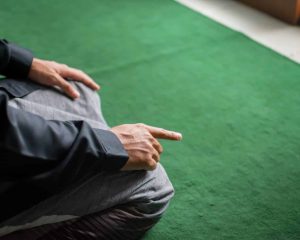
There are moments in life when the soul feels weighed down not by the body, but by the unseen heaviness of sin, regret, and heedlessness. We feel spiritually drained, our hearts distant from Allah, our peace unsettled. And yet, Allah, in His infinite mercy, has given us a purifier unlike any other: Salah.
Salah is not merely a ritual; it is a renewal. Five times a day, Allah invites us to pause and return to Him to cleanse, to realign, and to find light again. It is no coincidence that the Prophet Muhammad ﷺ compared salah to a cleansing stream. He said:
“If one of you had a river by his door and he bathed in it five times a day, would any dirt remain on him?”
His companions replied, “No, nothing would remain.”
The Prophet ﷺ then said, “That is the example of the five prayers by which Allah erases sins.” (Bukhari & Muslim)
A Spiritual Bath for the Heart
Imagine your heart as a mirror. Over time, sins and worldly distractions cloud its surface. Salah is the gentle polish that restores its shine. With every takbir, every rukū‘, and every sujūd, the stains of heedlessness fade away. You rise from prayer lighter, calmer, and closer to your Creator.
Each prayer wipes away the small mistakes and spiritual dust that gather throughout the day. It’s Allah’s mercy in motion a chance to start over, not once or twice, but five times daily.
Salah as a Pause from the Chaos
In a world that never seems to stop, salah teaches us stillness. It is the moment when time slows down and the heart finally listens. As you raise your hands and say Allahu Akbar, the world behind you fades. You enter a private conversation with your Lord — no filters, no pretence, just you and Him.
This pause is not a break from life; it’s what keeps life in balance. Without it, the heart dries up. With it, every challenge becomes bearable, every moment meaningful.
The Secret of Sujood
There’s a reason why sujood prostration is the closest moment between a servant and Allah. In that posture of complete humility, the ego is silenced. The forehead, which carries pride and identity, touches the ground in surrender. And from that very place of submission, peace begins to bloom.
Each time you bow your head, you declare silently: “I belong to You. My strength, my weakness, my dreams all of it returns to You.”
Salah and the Cleansing of Sins
Beyond its spiritual beauty, salah has a deep moral function. It restrains the believer from wrongdoing. Allah says:
“Indeed, prayer prohibits immorality and wrongdoing.” (Surah Al-‘Ankabūt, 29:45)
This means the more consistent and sincere our prayers, the more purified our actions become. True salah transforms character. It makes the heart softer, the tongue gentler, and the soul more conscious of Allah’s presence.
Finding Renewal in Every Rak‘ah
Salah is not meant to be mechanical. It’s not about racing through words we don’t feel. It’s about standing with presence khushu‘ a heart fully aware of Whom it stands before. When you pray with understanding and sincerity, every rak‘ah becomes a renewal of faith.
When life feels messy or directionless, salah brings clarity. When your heart feels burdened, salah lightens it. And when guilt makes you feel unworthy, salah reminds you that Allah never tires of your return.
Returning to the Source
To pray is to return home. Every adhan is a call not just to movement, but to mercy. It calls us back from distraction to devotion, from chaos to calm, from sin to forgiveness.
So when you stand on the prayer mat, remember: you are standing before the One who knows every secret, every fear, every silent cry. He does not look at how perfect your prayer is He looks at how sincere your heart is.
Let salah be your daily cleanser, your reset button, your peace. Because in the end, it’s not just a duty we perform it’s a mercy we live by.
“Indeed, successful are the believers — those who humble themselves in their prayer.” (Surah Al-Mu’minūn, 23:1–2)

